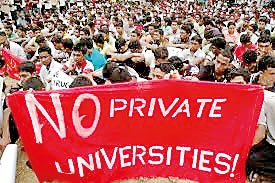University Teachers Group wants Public Commission on Education Reforms
Say support the call to end the MBBS programme at SAITM
As academics and activists, we are concerned about the Government’s plans for reform in the education sector.

The report of the Subcommittee on Higher Education of the Sectoral Oversight Committee on Education and Human Resources Development (The Parliament of Sri Lanka, 2016) proposes SAITM as a model for expanding private medical education. It promotes ‘Public-Private Partnerships’ where public universities will support private medical establishments, particularly through infrastructure and personnel.
The focus on SAITM has eclipsed the very great challenges facing us in the sphere of public education. These problems demand a systematic response. Ad hoc measures will be very destructive, and SAITM is such an ad hoc measure
In order to initiate a dialogue and to highlight the dangers involved in such a move, we responded to the report of the Sub-Committee on Higher Education of the Sectoral Oversight Committee on Education and Human Resources Development. On August 21, we met with the Sub-Committee to express our concerns.

The Government’s plans for reforms in higher education and the proposal to support private education hinges on the fact that 82% of those who qualify for admission are shut out from universities.
They propose private, for-profit, fee-levying institutions to address this problem. For the vast majority of the 82% who will not be able to access private education, the Government proposes loan schemes and voucher systems.
Numerous other ad hoc educational policies are being proposed and passed by the Cabinet without the consultation of the people of the country. Most recently, on August 22nd, the Cabinet approved the allocation of Rs. 2,700 million for a health insurance scheme for 4.5 million school children, proposed by the Minister of Education, once again without public consultation.
These educational reforms pose a serious threat to ‘free education.’
The focus on SAITM has eclipsed the very great challenges facing us in the sphere of public education. These problems demand a systematic response. Ad hoc measures will be very destructive, and SAITM is such an ad hoc measure. It, in no way, solves the larger problems of education, such as disparities in access to education based on wealth, regional differences, ethnicity and language.
It cannot address the resource problems that schools face, which prevent many students from pursuing their higher educational interests, or the struggles that universities face in offering educational programmes that fulfil the needs and aspirations of the public.
There is a crisis in Medical Education today.
Students have been boycotting lectures for over six months now. As an immediate solution to the crisis in medical education, we support the call to end the MBBS programme at SAITM. We ask the Government to take immediate steps to commence this process and create the conditions for the return of students to State medical faculties; and halt all activities that expand the privatization agenda specified in the subcommittee report.
The crisis in education calls for a review of the system. We call for a PUBLIC COMMISSION that is committed to hearing what the people have to say undertaken through a consultative process.
The Government’s commitment to such a commission would be consistent with the principles of free education. A policy for education, developed through a truly representative process, with a commitment to uphold free education as a fundamental value, will further the process of democratizing education, something that we see as essential to the future of our peoples.
Signed: Dr. Harini Amarasuriya-Open University and University Teachers for Free Education, Geethika Dharmasinghe-Alliance for Economic Democracy, Dr.Ramya Kumar 0University of Jaffna and University Teachers for Free Education, Dr. Shamala Kumar, University of Peradeniya and University Teachers for Free Education, Dr. Athula Samarakoon, Open University, and University Teachers for Social Equity, Niyanthini Kadirgamar, Alliance for Economic Democracy, Anura Karunatileke, University of Kelaniya and University Teachers for Social Equity, Dr. Prabha Manuratne, University of Kelaniya and University Teachers for Free Education, D.W. Asela Rangadewa, Univ. of Visual and Performing Arts and University Teachers for Social Equity, Prof. Sumathy Sivamohan, University of Peradeniya and University Teachers for Free Education, Waradas Thiagarajah, University of Colombo and Education Renaissance Programme, Amali Wedagedera, Alliance for Economic Democracy, Upul Wickramasinghe, Education Renaissance Programme, Dileepa Witharana, Open University and University Teachers for Free Education.
There will be a public meeting on Wednesday, September 13, on the theme WHAT PRICE PRIVATISATION OF EDUCATION at the Mahaweli Centre, Ananda Coomarasamy Road, Colombo 7, from 3-6 pm.

